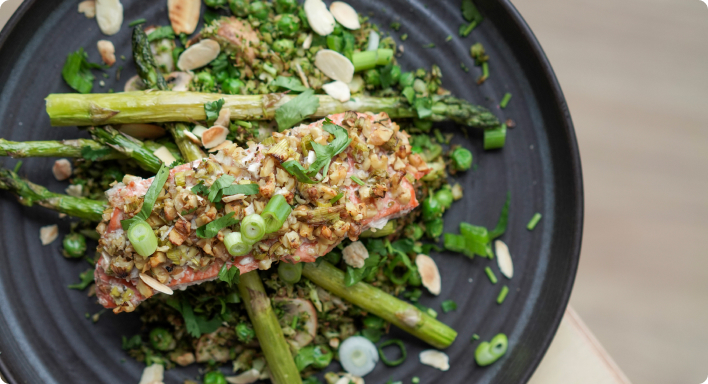We all know the age-old saying, “You are what you eat.” While it was once used to promote harmful dieting messages, when applied thoughtfully, this phrase still holds value today.
Yes, the foods we eat can have a profound impact on our brain, influencing:
- Concentration and focus
- Short-term memory
- Overall brain power
- Levels of anxiety and stress
- Age-related cognitive decline
That’s why it’s essential to include a variety of whole, nutrient-rich foods in your diet to support all aspects of your health, especially your brain.
Here’s our round-up of some delicious and nutritious foods to help keep your brain in tip-top condition.
Wholegrains
Just like your car, your brain needs fuel, and wholegrains are an excellent source.
Your brain runs best on glucose, and wholegrains provide it in the form of low-GI (glycaemic index) carbohydrates. This means they release energy slowly into the bloodstream, keeping your brain steady and focused throughout the day.
Adding wholegrains to your diet is easy. Try:
- Swapping white rice for brown rice
- Choosing wholewheat pasta with your favourite pasta sauce
- Spreading peanut butter on rye or sourdough bread instead of a crusty white loaf
Beyond brainpower, wholegrains offer a wide range of health benefits, including improving gut health, helping to lower cholesterol and supporting heart health.
Oily Fish
While research is still in its early stages, studies suggest that incorporating oily fish into your diet may help lower the risk of developing depression and dementia.
Oily fish are rich in omega-3 fatty acids, such as DHA and EPA, which are essential for healthy brain function and development.
Not sure which fish count as oily? Here are some of our top picks:
- Salmon
- Sardines
- Trout
- Mackerel
Much like wholegrains, oily fish also promote heart health and are a great source of protein, vitamin D, and selenium.
Nuts
Nuts are rich in vitamin E, a powerful antioxidant that protects brain cells from damage and has been linked to preventing slower cognitive decline.
They also make a great snack. They are high in fibre and healthy fats, supporting both your brain and gut health.
Some of our favourites include:
- Almonds
- Walnuts
- Brazil nuts
- Hazelnuts
Need some lunchbox inspo? A handful of nuts is the perfect pick-me-up to keep you going throughout the day.
Leafy Greens
We all know we should eat our greens; that is why parents have kept us at the dinner table for generations!
But why exactly are leafy greens so important? They’re packed with vitamin K, which studies suggest may help reduce the risk of dementia and cognitive decline.
Not sure what counts as a leafy green? We’ve got you covered:
- Spinach
- Kale
- Romaine lettuce
- Rocket
- Bok choy
Adding just a few servings of these into your weekly meals is a delicious step toward supporting long-term brain health.

Sarah's Take...
"As a Nutritional Therapist, I advocate for simple swaps that make these powerhouse foods a regular part of a well-rounded diet. With mindful eating, we can positively influence our daily energy levels and assist with weight management while also supporting brain function, heart health, and overall well-being.
But I’m totally aware that different lifestyles have different challenges, so I’m always working with my clients to help them make changes that are simple and realistic for them.
Some examples of how these changes can be incorporated are:
Busy Professionals: Quick meal prep is key! Opt for wholegrain wraps for an easy lunch, snack on nuts at your desk, and enjoy a grilled salmon dinner with steamed greens.
Active Individuals: Wholegrain pasta or rice bowls provide lasting energy. Pair oily fish with veggies for muscle recovery, and grab a handful of walnuts post-workout.
Families with Kids: Swap white bread for wholegrain sandwiches, blend spinach into smoothies (I promise that they won’t taste it!), and make fun dishes like homemade fish fingers using salmon.
Vegetarians/Vegans: Choose plant-based sources of omega-3 like chia and flax seeds, opt for nut butters as snacks, and enjoy grain-packed meals with plenty of leafy greens.
Older Adults: Focus on foods that support brain health—porridge with walnuts for breakfast, mackerel for lunch, and a hearty green salad for dinner.
By making these small, manageable changes, anyone can nourish both their brain and body, leading to improved overall health."

We know there is a lot to digest here, but a few simple swaps could make a great difference to not only your brain health but your overall wellbeing also.
Want some inspiration for dinner tonight? Try our Walnut Crusted Salmon with Asparagus & Broccoli Fried Rice for a delicious, brain power-boosting meal or try our health coaching for custom meal plans and nutrition support designed by Sarah to help you stay on track.

